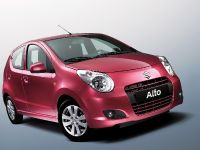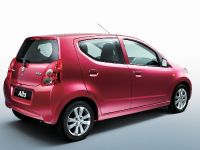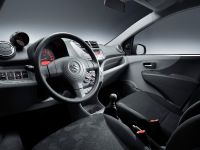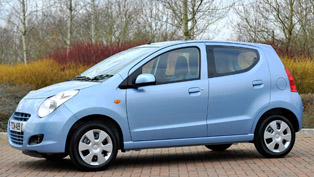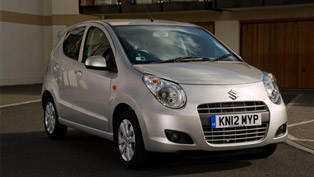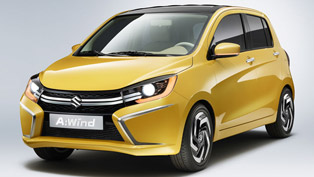New Suzuki Alto
At the 2008 Paris Motor Show, Suzuki is unveiling the all-new Alto — the fifth and smallest member of its acclaimed lineup of world strategic models. The new Alto combines eye-catching style and easy urban mobility with great performance in terms of fuel efficiency and CO2 emissions, thereby meeting the lifestyle needs of today's motorists and the pressing global need for environmental compatibility. Plus, it is one of the most fun-to-drive city cars available — a great new example of Suzuki's "Way of Life!" philosophy.
As the second model in the second phase of Suzuki's world strategy (a phase that's focused on user-friendliness and delivering expanded possibilities for family members), the new Alto offers good levels of comfort and convenience within a modest overall length.
Plus, a design that combines sporty, European-inspired looks with great aerodynamics means the new Alto is the most stylish car of its size.
The new Alto reflects the unparalleled knowledge of small-cars that has made Suzuki so successful with minivehicles in Japan and compact cars like the Swift all over the world. Alto is a definitive response to the need for enjoyable, eco-friendly motoring. Suzuki aims to achieve annual sales of 60,000 units in Europe following a sales launch in spring 2009.
Concept
- Eco-friendly
- Low CO2 emission and low fuel consumption
- Lightness achieved through downsizing
- Stylish and sporty design
- Ample roominess and comfort as a city commuter within compact dimensions
The new Alto is aimed mainly at urban people who want a small car that offers style and enjoyment together with great environmental credentials, and it reflects the ideals of the second phase of Suzuki's world strategy. At the heart of the concept for the new Alto is Suzuki's belief that people should be able to enjoy economical, eco-friendly motoring without sacrificing style, comfort, practicality, or performance. Compact dimensions (the new Alto is the smallest of Suzuki's world strategic models) play a large part in realising outstanding environmental credentials by keeping weight to a minimum, but without detracting from user-friendliness.
Design, Comfort and Practicality
- An aerodynamically efficient form
- Stylish, sporty and youthful design reflecting European tastes
- An environment that prioritises front-seat occupants
- Ample storage spaces and a roomy, user-friendly luggage area within the compact dimensions
The new Alto has a sporty, solid look that exudes urban energy despite the body's compact dimensions. The design is elegant and beautiful thanks to aerodynamically efficient contours that combine tautness with evocative curviness. It is ideally matched to European tastes and with a drag coefficient of just 0.30 promotes fuel efficiency and low CO2 emissions.
The cabin layout apportions most of the space to the front seats but still provides ample space for four adults. Handy storage spaces for small items are located all around the cabin. Notwithstanding the new Alto's compact exterior dimensions, there's a usable amount of luggage space behind the rear seats, and folding down the rear seatback expands the space into a roomy luggage area suited to daily use.
Dimensions
The new Alto has an overall length of 3,500mm, width of 1,600mm, height of 1,470mm and a wheelbase of 2,360mm.
Performance and Environmental Compatibility
- Euro 5 compliant 1.0-litre petrol engine
- Combined fuel consumption: 62.7mpg (4.5l/100km)
- CO2 emissions: 103g/km
- Front MacPherson strut suspension with high rigidity
- Rear suspension in Suzuki's proprietary 3-link rigid axle design
- A minimum turning radius of 4.5m
Engine and Transmissions The new Alto is powered by a three cylinder 1.0-litre petrol engine successfully launched as an engine of the Splash*. This unit is light and compact with low friction characteristics. Maximum power output is 68PS (50kW) with maximum torque of 90Nm. Fuel consumption is low at 62.7 mpg on the combined cycle and CO2 emissions are just 103g/km. Standard transmission is a five-speed manual and a four-speed automatic transmission (uncommon among one-litre cars) with gate-type shifter is available as an option.
* Available in certain markets
Suspension The front suspension is of MacPherson strut type and the large, high-rigidity suspension frame is complemented by further strengthening in the strut mounting areas for superior handling. The rear suspension has Suzuki's proprietary 3-link rigid axle design, and incorporates numerous refinements for the new car. The coil springs and dampers were tuned for optimum handling stability through extensive testing on roads in Europe.
Suzuki targeted handling that makes driving enjoyable on urban roads, so drivers enjoy linear response, gentle roll movements, light steering feel, and good absorption of shock and vibration. These benefits reflect the experience Suzuki has gained in motorsport around the world.
The new Alto has a minimum turning radius of just 4.5m making it easy to manoeuvre and park in tight spaces.
Safety
- Electronic Stability Program (ESP®*)
- Crushable structure, energy-dispersing frame and a high-rigidity body combined with lightness.
- Six airbags (SRS dual front airbags, SRS dual front-seat side airbags and SRS dual curtain airbags)
To help the driver avoid hazards on the road, the new Alto is available with Electronic Stability Program (ESP®*), which modulates the engine performance and applies the brakes during cornering and under aceleration.
In the unfortunate event of an accident, the new Alto's body reflects Suzuki's Total Effective Control Technology (TECT) concept in the form of crushable structures that absorb impact energy, frame members that disperse impact energy away from occupants and a strong cabin structure. Use of high-tensile steel for major body parts means the resulting high level of occupant safety does not add excessive weight to the body.
SRS front, side, and curtain airbags are available to reduce the severity of impacts suffered by occupants in the event of a collision. Energy-absorbing trim materials provide further head protection.
* ESP is a registered trademark of Daimler AG
Note: Figures are not yet homologated. The information in this press release is based on the specifications of the Alto for Europe. The Alto may have different specifications in other markets and full UK specifications will be released closer to the launch date in March 2009.
Alto Specifications
| Engine |
Petrol |
||
|
1.0l |
|||
| Drive system |
2WD |
||
| Transmission |
5MT/4AT |
||
| Steering |
LHD/RHD |
||
| Number of doors |
5 |
||
| DIMENSIONS | |||
| Overall length (mm) |
3,500 |
||
| Overall width (mm) |
1,600 |
||
| Overall height (mm) |
1,470 |
||
| Wheelbase (mm) |
2,360 |
||
| Tread | Front (mm) |
1,405 |
|
| Rear (mm) |
1,400 |
||
| Minimum turning radius |
4.5 |
||
| Minimum ground clearance |
150 |
||
| CAPACITIES | |||
| Seating capacity |
4 |
||
| Luggage capacity | Max. Volume (l) |
774 |
|
| Rear seatback folded (VDA method) (l) |
367 |
||
| Rear seatback raised (VDA method) (l) |
129 |
||
| Fuel tank capacity (l) |
35 |
||
| ENGINE | |||
| Type |
K10B |
||
| Number of cylinders |
3 |
||
| Number of valves |
12 |
||
| Piston displacement (cm3) |
996 |
||
| Bore x stroke (mm) |
73.0 x 79.4 |
||
| Compression ratio |
11.0 |
||
| Maximum output (PS/kW/rpm) |
68PS/50/6,000 |
||
| Maximum torque (Nm/rpm) |
90/4,800 |
||
| Fuel distribution |
Multipoint injection |
||
| TRANSMISSION | |||
| Type |
5MT |
4AT |
|
| Gear ratio
|
1st |
3.454 |
2.875 |
| 2nd |
1.904 |
1.568 |
|
| 3rd |
1.280 |
1.000 |
|
| 4th |
0.966 |
0.698 |
|
| 5th |
0.815 |
- |
|
| Reverse |
3.272 |
2.300 |
|
| Final gear ratio |
3.650 |
4.375 |
|
| CHASSIS | |||
| Steering |
Rack and pinion |
||
| Brakes | Front |
Ventilated disc |
|
| Rear |
Drum, leading and trailing |
||
| Suspension | Front |
MacPherson strut with coil spring |
|
| Rear |
3-link rigid axle with coil spring |
||
| Tyres |
155/65R14 |
||
| WEIGHTS | ||
| Kerb weight (min./with full options) (kg) |
855/885 |
880/910 |
| Gross vehicle weight (kg) |
1,250 |
|
| PERFORMANCE | ||
| Maximum speed (mph) |
96 |
93 |
| 0-60mph (sec) |
14 |
17 |
| ENVIRONMENTAL PERFORMANCE | ||
| Emission standard compliance |
Euro5 |
|
| Fuel consumption (Combined) (litres/100km) |
62.7 |
53.3 |
| CO2 emissions (Combined) (g/km) |
103 |
122 |

